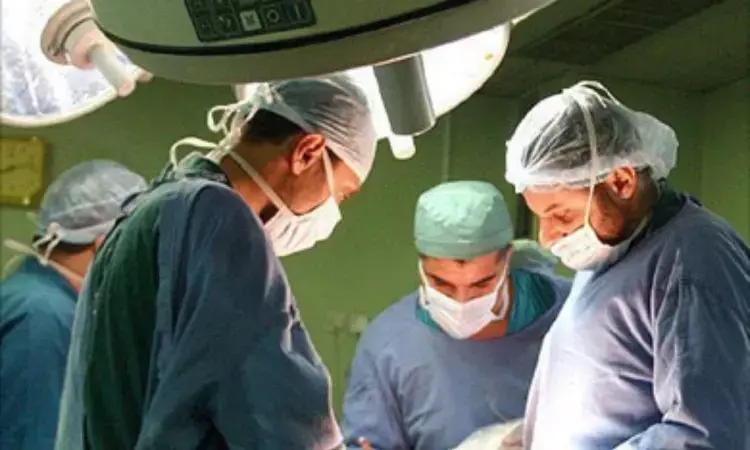- Home
- Medical news & Guidelines
- Anesthesiology
- Cardiology and CTVS
- Critical Care
- Dentistry
- Dermatology
- Diabetes and Endocrinology
- ENT
- Gastroenterology
- Medicine
- Nephrology
- Neurology
- Obstretics-Gynaecology
- Oncology
- Ophthalmology
- Orthopaedics
- Pediatrics-Neonatology
- Psychiatry
- Pulmonology
- Radiology
- Surgery
- Urology
- Laboratory Medicine
- Diet
- Nursing
- Paramedical
- Physiotherapy
- Health news
- Fact Check
- Bone Health Fact Check
- Brain Health Fact Check
- Cancer Related Fact Check
- Child Care Fact Check
- Dental and oral health fact check
- Diabetes and metabolic health fact check
- Diet and Nutrition Fact Check
- Eye and ENT Care Fact Check
- Fitness fact check
- Gut health fact check
- Heart health fact check
- Kidney health fact check
- Medical education fact check
- Men's health fact check
- Respiratory fact check
- Skin and hair care fact check
- Vaccine and Immunization fact check
- Women's health fact check
- AYUSH
- State News
- Andaman and Nicobar Islands
- Andhra Pradesh
- Arunachal Pradesh
- Assam
- Bihar
- Chandigarh
- Chattisgarh
- Dadra and Nagar Haveli
- Daman and Diu
- Delhi
- Goa
- Gujarat
- Haryana
- Himachal Pradesh
- Jammu & Kashmir
- Jharkhand
- Karnataka
- Kerala
- Ladakh
- Lakshadweep
- Madhya Pradesh
- Maharashtra
- Manipur
- Meghalaya
- Mizoram
- Nagaland
- Odisha
- Puducherry
- Punjab
- Rajasthan
- Sikkim
- Tamil Nadu
- Telangana
- Tripura
- Uttar Pradesh
- Uttrakhand
- West Bengal
- Medical Education
- Industry
Copeptin measurement potential tool to predict Diabetes Insipidus after pituitary surgery

Copeptin analysis can be used to predict which patients are at risk of developing Diabetes Insipidus following transsphenoidal adenomectomy (TSA), a recent study has shown
The has been published in Research Square journal
Pituitary gland surgery is often accompanied by a postoperative complication of diabetes insipidus. It could be an immediate after effect or may occur transiently over time.
Efficient diagnosis of Diabetes Insipidus is limited by the challenge of directly assaying arginine vasopressin (AVP),which has a short half-life in vivo, is unstable ex vivo even when frozen. It is also affected by a slow or incomplete separation from platelets.
The study involved collecting plasma samples from 78 patients undergoing elective transsphenoidal adenomectomy (TSA) at the John Radcliffe Hospital (Oxford University Hospitals NHS Foundation Trust, Oxford, UK) between November 2017 and June 2020.
Patients were made to undergo preoperative magnetic resonance imaging (MRI) of the pituitary with contrast and all scans were reported by a Neuroradiologist. Lesions < 1 cm in diameter were classified as microadenomas and those≥ 1 cm in diameter classified as macroadenomas.
A single Neurosurgical team carried out all the transsphenoidal adenomectomies. Operations were carried out under general anesthetic using endoscopic techniques.
It was suspected that the patient may have developed Diabetes Insipidus if their urine output was more than 200 mL/hour for 3 consecutive hours or more than 3 L per day, and this was confirmed with biochemistry showing high plasma sodium (> 145 mmol/L) and osmolality (> 295 mosmol/kg) with inappropriately low urine osmolality.
The researchers found the following
78 patients undergoing transsphenoidal adenomectomy had a median age of 55 (range 22–85), with 41 of 78 being men (52.6%).
Two patients had estimated glomerular filtration rates < 30 ml/min/1.73m2 , and neither of these developed Diabetes Insipidus.
The majority of lesions (72/78; 92.3%) were macroadenomas, while histologically gonadotroph tumors were the most common (37/78; 47.4%).
"We confirm that post-pituitary surgery copeptin measurement is useful to exclude Diabetes Insipidus early postoperatively and propose it as a potential tool to identify patients suitable for early discharge. It will be important to conduct future work on earlier sampling times, with real-time assay, and combine these results with other clinical and biochemical parameters to provide a robust dataset at 24 hours post-pituitary surgery enabling selection of patients for safe early discharge", the researchers concluded.
You can read the study by clicking on the following link
DOI: https://doi.org/10.21203/rs.3.rs-1372750/v1
Dr Kamal Kant Kohli-MBBS, DTCD- a chest specialist with more than 30 years of practice and a flair for writing clinical articles, Dr Kamal Kant Kohli joined Medical Dialogues as a Chief Editor of Medical News. Besides writing articles, as an editor, he proofreads and verifies all the medical content published on Medical Dialogues including those coming from journals, studies,medical conferences,guidelines etc. Email: drkohli@medicaldialogues.in. Contact no. 011-43720751


